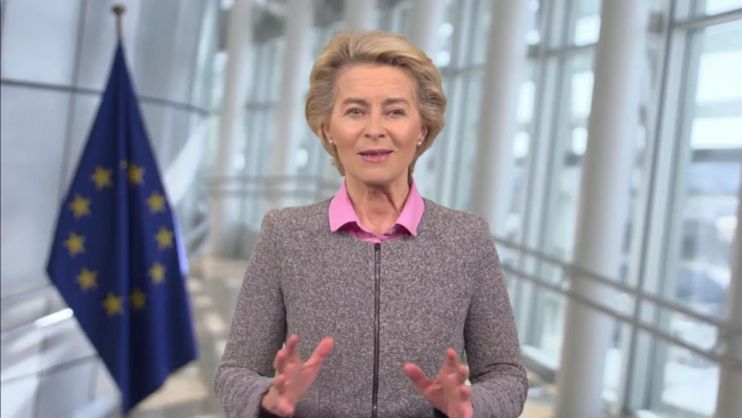European Commission calls for reciprocity on vaccine exports with the UK

European Commission president Ursula Von der Leyen has called for reciprocity on vaccine exports amid an ongoing row with the UK and US over jab deliveries.
“I ask for greater openness as Europe is among the regions in the world that exports the most, but reciprocity is needed,” she told Italian newspaper la Repubblica.
She added that the EU was in contact with UK leaders over vaccine exports, but declined to give details of her talks with the Prime Minister.
Von der Leyen said details around enforcing exports reciprocity would be discussed with other European countries at a meeting next Thursday.
The European Commission president said on Wednesday that the bloc was facing “the crisis of this century” as vaccine supplies continue to dwindle across the continent.
Von der Leyen sparked widespread anger as she threatened to block vaccine exports to the UK and other countries with high vaccination rates for the second time during a bitter dispute over the EU’s sluggish jab rollout.
Foreign secretary Dominic Raab likened her threats to a dictatorship, as he warned that the “world is watching” the EU’s handling of the vaccine shortage.
“All of us, including our European friends, have been saying throughout the pandemic that you’d be wrong to curtail or interfere with lawfully-contracted supply. We said it last year on PPE. We’ve been saying it this year on other things,” he said.
“Frankly I’m surprised we’re having this conversation,” Raab added. “It is normally what the UK and EU team up with to reject when other countries with less than democratic view than our own engage in that kind of brinkmanship.”
An average of just 10 per cent of Europeans have received their first dose of a Covid vaccine, according to the European Centre for Disease Prevention and Control’s Covid-19 Vaccine Tracker.
That compares to 25.7m people who have received their first injection in the UK — equivalent to almost 39 per cent of Britain’s population.
Von der Leyen said she was “extremely confident” that Europe would hit its goal of vaccinating 70 per cent of its adult population by the end of the summer, despite the recent suspensions and delays of the Astrazeneca vaccine.
Astrazeneca ban
More than fifteen countries issued a temporary ban on the Astrazeneca vaccine this week over reports of blood clots among patients in several countries.
The European Medicines Agency (EMA) said yesterday it remains “firmly convinced” that the benefits of the Astrazeneca vaccine outweigh the small risk of side-effects, as it gave the jab the green light for use across the bloc.
France, Spain, Italy and Germany are among the European countries that confirmed last night they will resume rolling out the Astrazeneca vaccine following the EMA’s ruling.
However, the EU has begun looking at other alternatives to plug potential shortfalls in its vaccine supply.
Von der Leyen announced on Twitter earlier this week that the EU had agreed an “accelerated delivery of 10m doses” of the Pfizer vaccine to be supplied over the next three months.
She also confirmed this morning that Russia’s Sputnik vaccine was still under review, though it would need to be approved by the EMA before being rolled out across Europe.